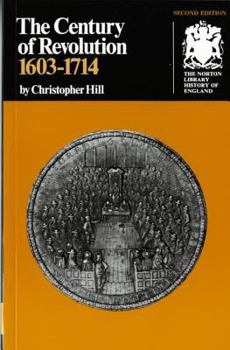The Century of Revolution 1603-1714
(Part of the The Norton Library History of England Series)
Select Format
Select Condition 
Book Overview
During this period modern English society and a modern state began to take shape, and England's position in the world was transformed.
The Century of Revolution tries to penetrate below the familiar events to grasp when happened--to ordinary English men and women as well as to kings and queens or abstractions like "society" and "the state."
In this new edition, Dr. Hill includes the most important conclusions of recent research and...
Format:Paperback
Language:English
ISBN:0393300161
ISBN13:9780393300161
Release Date:September 1982
Publisher:W. W. Norton & Company
Length:304 Pages
Weight:0.66 lbs.
Dimensions:0.7" x 5.1" x 7.7"
Related Subjects
17th Century England Europe Great Britain History Modern (16th-21st Centuries) WorldCustomer Reviews
3 ratings
Between Elizabeth and the (American) Revolution
Published by Thriftbooks.com User , 15 years ago
This is a great book for learning the basics of a very tumultuous century. Like most Americans (at least those that know some history) all I really knew about the 17th century was James and Charles (2 each), Puritans, Pilgrims and Cromwell. I kind of knew about William and Mary and Anne, but wasn't too clear. However between Elizabeth and the start of the (American) Revolution England became a major power in Europe, political power had moved decisively from the King/Queen to Parliament and the Industrial Revolution was starting. This book covers a great deal of that change. It reads like a cram book for taking a test, that is it gives a lot of information and names and dates and assumes you already recognize them. This isn't too hard to overcome because it does tell you what they did. It is broken down into 3 forty year and one 26 year sections covering before the Civil War, the Civil War and Cromwell, afterward until the Glorious Revolution (1688,) and then until the first George. Each book has a section on politics, economy, religion and ideas (every idea had religious implications) and then a concluding overview. The one (minor) quibble I have is that a lot of the political and economic changes are said to have been 'necessary'. That is only true if you accept that the Industrial Revolution was necessary or preordained. Once you have read this you will have a basic grasp of what happened and why.
A CENTURY OF REVOLUTION, INDEED!
Published by Thriftbooks.com User , 17 years ago
The late eminent British Marxist historian Christopher Hill is better known for his pioneer work in the micro-history of the English Revolution and the influences of left-wing political forces such as the Levellers and Diggers and religious forces such the Quakers, Shakers, Ranters and Seekers on it. Here he has written an overview of the entire 17th century as part of this series of books on the history of England to modern times. Needless to say some of his work around the English Revolution seeps into this work as well, which makes that period the strongest section of the book. Professor Hill traces the major social, political, economic and religious trends that culminated in the revolution back to the reign of James I (and some economic trends back to Elizabethan times). He covers such keys areas of conflict as the changes in land use and ownership, agricultural innovations including the highly controversial enclosure policy, governmental foreign policy which tended to have a distinctly Catholic, particularly pro-Spanish, orientation, the embryonic beginnings of the split between court and `country' as a result of Stuart arbitrary rule, the split between landed proprietors and city merchants; the city and the country, the established church and the numerous pro-Puritan (read Calvinist) sects that started to sprout up like wildfire and the rise of a secular democratic movement based in the cities that both the Army and the Levellers would draw upon in the Civil War period. Special note should be taken of the decades between the beginning of the defensive parliamentary struggles against Charles I in 1640 and 1660 with the restoration of his son Charles II to the throne. At this point the tensions that were merely outlined by the prior policies of the Stuart governments came to the breaking point. Hill does more than merely narrate that story. He shows, based on his well-stocked body of knowledge about the period, the various stages that the revolution went through from vascillations of the first defensive struggles of the Parliamentarians to the definitive break with Charles and the establishment of the New Model Army which would usher in a period of military dominance of government and society and with it the rise and fall of the various secular and religious democratic movements. Hill also does a masterful job of showing how the various plebian democratic forces in society reacted to governmental policy (and how the government dealt with those forces) and how, as a result, these various fights sapped the revolutionary energy of the masses. As more than one historian and sociologist has noted, as a general proposition the study of post-revolutionary periods tends to be rather anti-climatic. That is also the case here with the restoration of Charles II. England, however, exhibited that trend in revolutionary history that demonstrates that even when the revolution runs out of steam there is generally no regression back to the old ways of
worthy
Published by Thriftbooks.com User , 25 years ago
Although there have been a seemingly infinite amount of books written on 17th century England, this one stands out from the rest. Although it is not exactly a thoroughly in depth study, it provides ample knowledge about all of the important people and events of the era. It is also helpful that each division of the era is looked at in several different fields of study, including the often overlooked area of economics.




